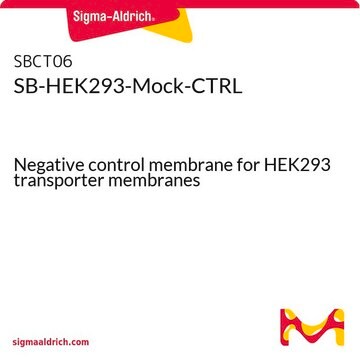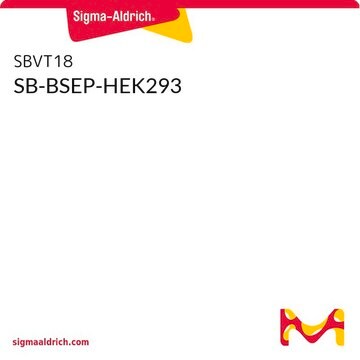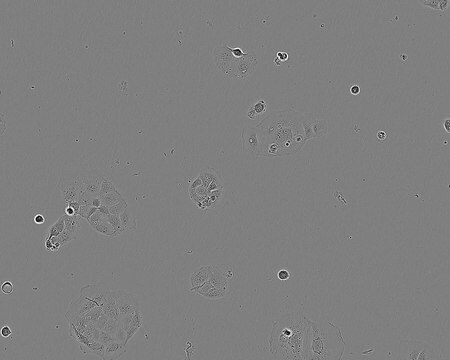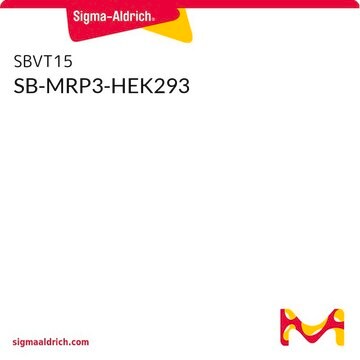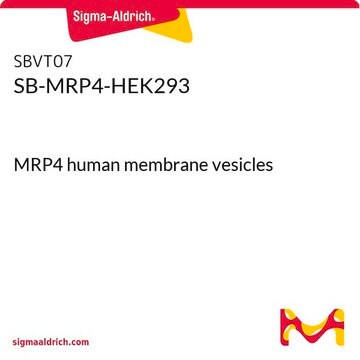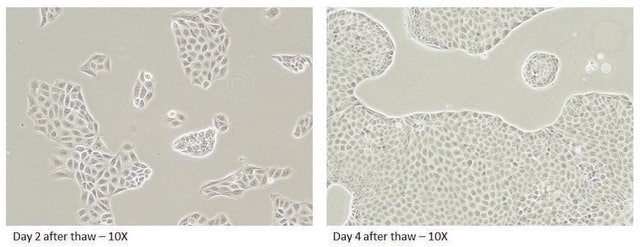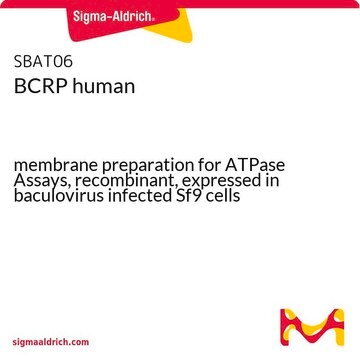추천 제품
일반 설명
Membrane Preparations for Vesicular Transport Assays (VT) are suitable for general drug-efflux transporter interaction studies. Both substrate and inhibitor interactions can be assessed using vesicles. The success of substrate interaction studies strongly depends on the passive permeability of the compound. High permeability substrates might not be detected. Control Membranes with no-, or significantly lower transporter activity are also available.
애플리케이션
In the vesicular transport assay so-called "inside-out" membrane vesicles containing ABC transporters are applied. Incubating substrates of the respective efflux transporter in the presence of the inverted membrane vesicles and ATP will allow measuring accumulation of the substrates into the vesicles. In many cases radiolabeled reporter substrates are used but recently SOLVO developed the new PREDIVEZ Vesicular Transport Kits that use fluorescent reporter substrates.
The standard vesicular transport assay is an inhibitory assay performed with cold test articles. This assay provides information on any interaction between the ABC transporter and the test article. The transport of the reporter substrate is measured in the presence of the test article (typically in 7 concentrations) and IC50 is defined as the concentration inhibiting the transport of the reporter substrate by 50%.
Should radiolabeled form of the investigated compound or adequate analytical methods (LC/MS, HPLC) be available, the vesicular transport assay may be performed in a direct format without the reporter substrate and may identify substrate nature of the test article. The vesicular transport substrate assay is a low throughput assay. It is suitable for low permeability test compounds as high permeability compounds may escape from the vesicles through the lipid bilayer.
PREDIVEZ vesicular transport kit is sold separately. This transporter membrane vesicle assay requires the PREDIVEZ vesicular transport kit and corresponding control membrane below:
SB PREDIVEZ Reagent Kit for BCRP part number SBPVR4-9RXN and corresponding control membrane SB-HEK293-Mock-CTRL part number SBCT06-1EA
The standard vesicular transport assay is an inhibitory assay performed with cold test articles. This assay provides information on any interaction between the ABC transporter and the test article. The transport of the reporter substrate is measured in the presence of the test article (typically in 7 concentrations) and IC50 is defined as the concentration inhibiting the transport of the reporter substrate by 50%.
Should radiolabeled form of the investigated compound or adequate analytical methods (LC/MS, HPLC) be available, the vesicular transport assay may be performed in a direct format without the reporter substrate and may identify substrate nature of the test article. The vesicular transport substrate assay is a low throughput assay. It is suitable for low permeability test compounds as high permeability compounds may escape from the vesicles through the lipid bilayer.
PREDIVEZ vesicular transport kit is sold separately. This transporter membrane vesicle assay requires the PREDIVEZ vesicular transport kit and corresponding control membrane below:
SB PREDIVEZ Reagent Kit for BCRP part number SBPVR4-9RXN and corresponding control membrane SB-HEK293-Mock-CTRL part number SBCT06-1EA
포장
500 μL
물리적 형태
Supplied as frozen membrane vesicles, containing 5 mg/ml membrane protein, labeled with volume, catalog number (transporter) and date of production.
법적 정보
Distributed for SOLVO Biotechnology, Inc.
Storage Class Code
10 - Combustible liquids
WGK
WGK 1
Flash Point (°F)
Not applicable
Flash Point (°C)
Not applicable
가장 최신 버전 중 하나를 선택하세요:
Márton Jani et al.
Journal of pharmaceutical sciences, 100(1), 94-97 (2010-06-25)
Ivermectin is an antiparasitic drug frequently administered to humans. It has a limited brain exposure that is attributed to the efflux activity of ABCB1/Abcb1. ABCG2/Abcg2 is also a major transporter present in most pharmacologically important barriers. However, interaction of ivermectin
Albert Mennone et al.
Drug metabolism and disposition: the biological fate of chemicals, 38(10), 1673-1678 (2010-07-06)
Breast cancer resistance protein (Bcrp) is a member of the ATP-binding cassette membrane transporter family, which is expressed apically in liver, kidney, and intestine epithelium. Recent reports suggest that in addition to xenobiotics, porphyrins, and food toxins, Bcrp can also
Márton Jani et al.
Biological & pharmaceutical bulletin, 32(3), 497-499 (2009-03-03)
The pharmacokinetics of sulfasalazine, an anti-inflammatory drug is influenced by ATP-binding cassette G2 (ABCG2) (breast cancer resistance protein (BCRP), mitoxantrone resistance protein (MXR)) both in vitro and clinically. Due to its low passive permeability, the intracellular concentration of sulfasalazine is
E Kis et al.
Annals of the rheumatic diseases, 68(7), 1201-1207 (2008-04-10)
Earlier publications have suggested a possible role for the efflux transporter breast cancer resistance protein (BCRP) in acquired resistance to disease-modifying antirheumatic drugs (DMARDs) such as leflunomide and its metabolite A771726 (teriflunomide). However, there is no direct evidence that BCRP
M Maliepaard et al.
Cancer research, 61(8), 3458-3464 (2001-04-20)
High expression of the Breast Cancer Resistance Protein (BCRP) gene has been shown to be involved in resistance to chemotherapeutic drugs. Knowledge of the localization of BCRP protein in normal tissues may help unravel the normal function of this protein.
자사의 과학자팀은 생명 과학, 재료 과학, 화학 합성, 크로마토그래피, 분석 및 기타 많은 영역을 포함한 모든 과학 분야에 경험이 있습니다..
고객지원팀으로 연락바랍니다.